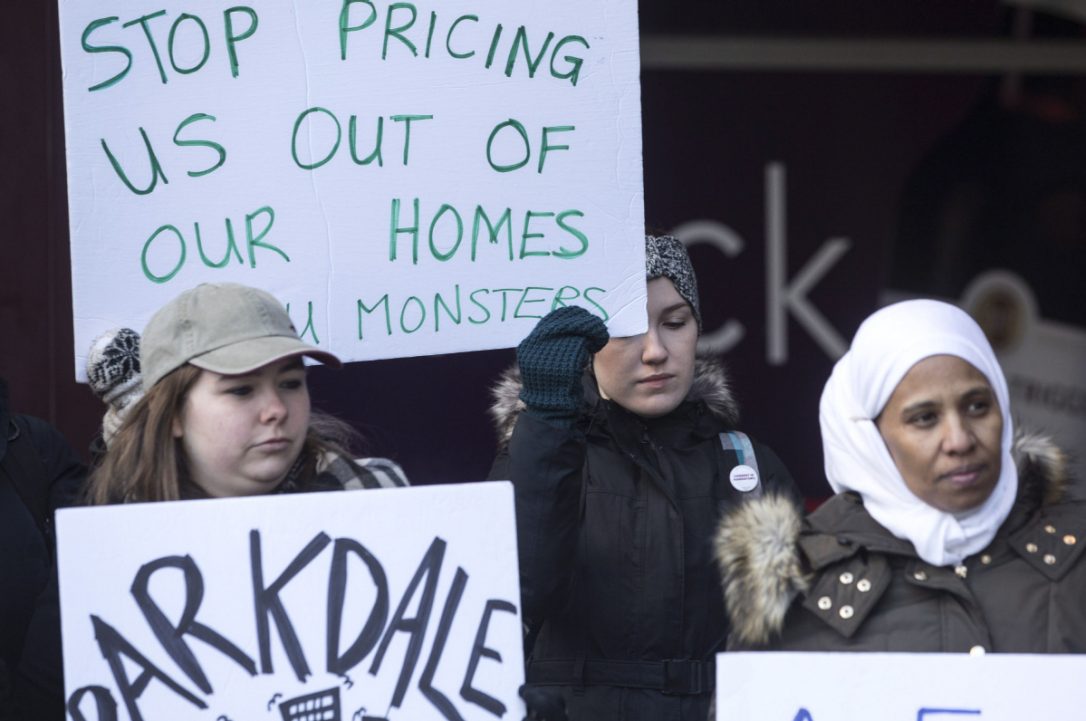Toronto Star: Parkdale residents protest ‘loophole’ allowing landlords to drive up rent
Posted February 5, 2018
More than 50 tenants of one building are refusing to pay rent after their landlord applied to the government to increase rent by nearly double the legally permitted amount.
Posted February 5, 2018
 Tenants at a highrise in an up-and-coming Toronto neighbourhood have staged a rent strike, saying landlords are taking advantage of loopholes in Ontario’s housing law to drive low-income residents out of their homes.
Tenants at a highrise in an up-and-coming Toronto neighbourhood have staged a rent strike, saying landlords are taking advantage of loopholes in Ontario’s housing law to drive low-income residents out of their homes.More than 50 tenants of a building in Toronto’s rapidly gentrifying Parkdale community are refusing to pay their rent after the property manager — Nuspor Investments — applied for government permission to increase rent by nearly double the legally permitted amount.
“This building is going to kick people out with the rent increases if they’re allowed to go above the (provincial rent) guidelines,” striking tenant Mark Farquharson said.
“A lot of people in this building are pensioners and they’re going to be gone in another five years because they can’t afford it.”
Last year the government of Ontario extended rent control — which previously had applied only to units that came into use prior to November 1991 — to all residential properties in the province, setting an annual cap on rent increases tied to the Consumer Price Index. The cap for 2018 is 1.8 per cent.
But a long-standing policy in the Residential Tenancies Act allows property owners and managers to apply to the Landlord and Tenant Board for the right to raise rent beyond the cap in order to recoup costs of certain capital expenditures or “extraordinary” increases in tax.
“This is a loophole in the legislation that basically lets landlords pass off the costs of major work onto tenants,” said Cole Webber, spokesperson for Parkdale Community Legal Services.
Landlords in gentrifying parts of Toronto are increasingly taking advantage of this legislation in an effort to squeeze out low-income tenants, Webber added.
Once a unit is vacant, landlords can legally raise rent without limit.
To be eligible for a higher-than-permitted rent increase, a landlord must show that their capital expenses were made to keep the property “in a good state of repair,” protect the “physical integrity” of the building, improve energy or water conservation, or maintain or increase security or provide access to people with disabilities.
Nuspor Investments, for instance, claimed in its application to the Landlord and Tenant Board that it spent more than $300,000 in 2015 and 2016 on improvements to their building’s lobby, lighting, heating and garbage compactor. Representatives of Nuspor did not respond to multiple requests for comment.
Farquharson said he and his wife paid about $1,150 per month when they moved into their one-bedroom apartment four years ago. If Nuspor’s rent increase request is approved, they’ll pay $1,250, Farquharson said.
“It’s not easy to save money when … there’s a lot of money going toward just rent,” he added. “And the apartment hasn’t changed, it’s the same apartment we moved into.”
The Landlord and Tenant Board can approve a rent increase of up to three percentage points above the cap each year for up to three years for capital expenditure applications.
More than 650 applications for above-guideline rent increases have been made in Toronto alone since the start of 2015.
Landlords may not get the increase amount they ask for, but applications to raise rent by more than the guideline are generally approved, the Landlord and Tenant Board said.
Many tenants do not know enough about the process to challenge a landlord’s application, while others may not be able to take a day off work to attend the hearing, said Kemba Robinson, a spokesperson for the anti-poverty group ACORN Canada.
Rent hikes are turning Toronto into a city exclusive for the wealthy, she said.
“Working-class families are not able to afford rent here,” Robinson added. “We believe above-guideline rent increases should be (abolished).”
Landlords, however, say the process helps them perform necessary maintenance on their properties.
“Many of these buildings may be 40, 50, 60 years old so you have things that need upgrading,” Jim Murphy, president of the Federation of Rental Housing Providers of Ontario, said.
“The (rent increase application) process is not automatic,” he added. “The property manger or owner has to show the work that has been done, and the need for the work, and tenants and others can challenge that information at the Landlord and Tenant Board. There’s a thorough and formal process.”
Rather than simply focusing on rent control, the government should look at increasing income, Murphy added.
“The people who can’t afford rent are the same people who can’t afford to go to the grocery store,” he said.
The provincial government is “working hard to make sure everyone in Ontario has an affordable place to call home,” said Matt Ostergard, spokesperson for Minister of Housing Peter Milczyn.
Those efforts include a $125-million, five-year rebate program encouraging developers to build more rental apartments, and the creation of a “housing supply” team to help streamline the development approvals process, Ostergard added.
Toronto deputy mayor Ana Bailao, chair of city council’s affordable housing policy, said the above-guideline application process does not necessarily need to be abolished, but that government should review the criteria under which applications are approved.
“Buildings need to be upkept and that should be included in your month-to-month rent, but just because you get your much-needed unit renovations or new windows on your building you shouldn’t get a huge rent increase,” Bailao said.
“A good landlord should know those things will come up in building’s lifetime and should be making provisions for that in their business (plan).”
***
Article by Peter Goffin for The Toronto Star
